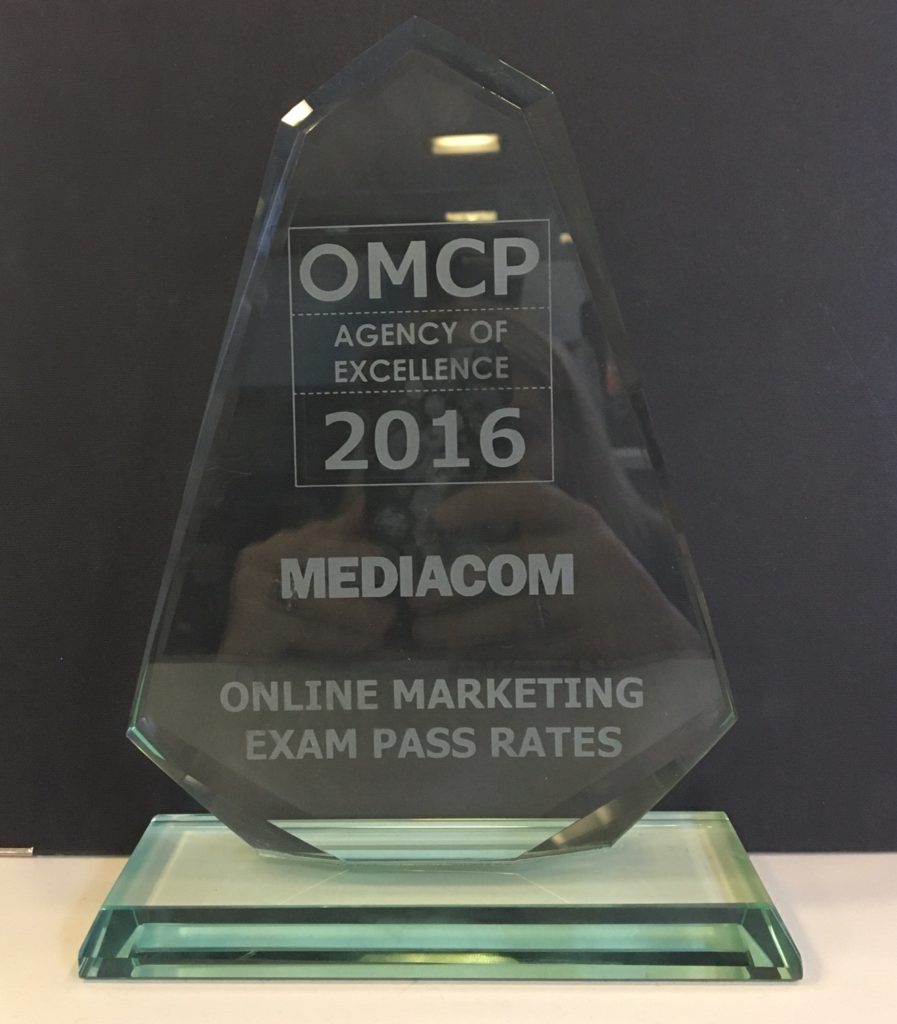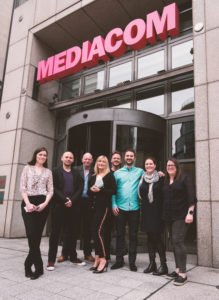The OMCP 2016 Agency of Excellence Award for Online Marketing Exam Pass Rates goes to MediaCom.
MediaCom, a leading agency based in the UK, already had the digital marketing expertise to service clients within the agency. Always looking to improve their service, they identified an opportunity to broaden overall digital capability across and between departments by increasing individual digital knowledge at all levels. Their training goal was to create better internal communication and deliver more effective and creative marketing solutions to meet their client objectives.
96% Pass Rate
Results were spectacular. In 2016, MediaCom achieved a 96% pass rate on online marketing certification exams after training for over 500 staff in partnership with Circus Street.

Key differentiators for MediaCom’s program include:
- Significant management buy-in and support of the training commitment
- League competition between departments
- Clear metrics set ahead of time
- Pre-tests before learning modules
- Outsourced, up-to-date training curriculum
- L&D team has knowledge of digital marketing
- Treat participants as adults with respect to training time allocation
- Mobile and online access to training
OMCP’s Michael Stebbins interviewed Emma Johnson Head of Learning & Development at MediaCom to learn how the program achieved its success.
OMCP: Emma, congratulations on your award. Before we dive into how you and the team achieved it, can you tell our audience a bit about your background and the scenario for the training?
The L&D Team

Emma: Right, okay. So I’ve been at MediaCom for 16 years. I’ve been learning and development for 12 years. And in this office, we look after about 1,100 people. About 900 of those people are London people who fall directly within my remit. And then we also have another 300, 400 people who are part of our local and global teams who fall indirectly in my remit.
So about 500, 600 people are in client-facing roles. These are the people that meet the skill development piece that we’ve been working on around digital knowledge and digital expertise.
OMCP: And your background is in creating training programs or bringing people up to speed. Is it more from academic or more from corporate?
Emma: It’s all corporate. So actually I’m in my second career now. So initially I was a planner. So I worked in the main business, running accounts. So I did the job that the people I’m now training and helping with learning interventions for. And then about 13, 14 years ago I started to transition across into an L&D role. So all my experience has been in a corporate environment.
OMCP: Have you attained any formal training for how to do this or is it something you just kind of had a knack for?
Emma: Well, some of it was intuitive and I’m also a qualified coach. And I’ve done lots of trainer trainer type cases of development work myself. So I train and coach people, so I’m also able to..but also because of my experience in the business itself, I understand what these people are doing and I understand the pressures and the skills gaps that exist. So that actually, it’s quite a useful backdrop in being able to design and implement learning interventions in people.
OMCP: So typically the training that you’re providing, my guess this is that digital marketing is just a part of that?
Emma: Absolutely. Yes.
OMCP: Can you describe your support team? Is it you and that’s it? Or do you have a group who help you, a producer, LMS development? Who do you have?
Emma’s Keys:
|
Emma: So I’m part of the wider HR team. So I have resource I can draw on from the HR team. So Circus Street, who have been our partner in this particular learning initiative, are an external partner. So they provide an LMS essentially, a digital skills LMS. We have our own formal LMS activity as well. And then I work with key stakeholders in the business in terms of how we develop and land some of these things. And that’s largely behind, I guess, the success story of the [training provider] Circus Street activity. We’ve had fantastic partners with Circus Street. And then we’ve had absolute key drivers within the business who are working in the business to land this stuff and make it, kind of, fly, really.
OMCP: You have cooperative managers and a good vendor.
Emma: Yes. Basically, that sums it up in a nutshell. Absolutely.
The Motivation
OMCP: So let’s talk about this specific program. And often times these programs are either driven by senior management where they come to you and they say, “Emma, this is what we need to achieve,” or you get it from the internal where the staff or the managers are saying, “We need to develop these skills. Give us money and resources.” Or it comes from the L&D. Did I hit one of them there or was it a different scenario that led up to this?
Emma: I think it’s a combination of all those things. But missing an element as well in terms of, you know, MediaCom’s clients saying, “We need some of this innovation. We need to see more work in this area, in the digital area.” So management is certainly saying, “This is huge quickly. This is why we built skills for the future and make sure that everybody’s future-proof for their roles.” And then confidence from the teams themselves in saying, “Actually, this is all the stuff we know that we should be doing but we don’t yet feel like we know enough about it. So it’s good to have something that helps us to know more about that.” And then L&D being able to take a step back and look at that and set out, “Look, there’s these gaps going on here and we need to find something that fills those gaps quickly.”
OMCP: Then it’s combination of concert, everybody cooperating. If you were to give advice to somebody who is new to the L&D role, maybe for a smaller or corporate group, what advice would you give somebody before putting together a program like this in the initial steps?
Emma: Good question. I guess as with any kind of learning piece is, “What are you trying to solve?” What actually are you trying to solve has got to be your starting point. And actually, what are the skills you need today? What are the skills you’re gonna need in three or five years time? What currently exists, what doesn’t exist, and how do you meet those needs in the middle? So I guess that would be my starting point for anything is what is going to be meaningful in terms of the way these people are able to do their jobs both now and in the future? Because there’s no point in training somebody for tomorrow because you’re going to have a piece that just keeps having to evolve and develop. You’ve got half an eye on the future, but you can’t design any kind of learning intervention unless you know what you’re trying to solve.
Time for Training
OMCP: Fair enough. Oftentimes when we have staff on billable hours, it’s a big fight between billable hours and time allocated for training. How did you approach that?
And we give them time off to study for the exam because that now seems to be an industry standard. |
Emma: Well, and that’s why we had a great training vendor, I guess, is because they have a product that is available via PC, mobile app. So there’s lots of different touch points. We have multiple departments across the business, and so there is no one size fits all. So we created the learning that was relevant and specific to particular teams and we said, “You’ve got access to this in any way that suits you.”
So, MediaCom is a youthful agency. We’ve got lots of Gen Y and younger in the organization. They’re not used to receiving training in the way that maybe you or I might be used to receiving training, where we might sit in a room and have some formal classroom training. That prescriptive and it’s within certain confines and hours.
So we opened this up into an interactive experience, something that they could do when it suited them in their own time, in their own way. So they could do it remotely, they could do it in the office, however they needed to do that.
And we made sure that the learning was broken up into bite-sized chunks. They didn’t have to allocate three or four hours at a time, they could just do little bits as and when they could create that time in their day. So they didn’t have to even do a whole module at a time. They could literally do 10 minutes, pause it, and then when they came back it would pick up again from where they left off. So it gave them the control and the responsibility and the accountability about how their learning suited them.
OMCP: Emma, you said “during their day.” Is that a policy or an expectation that your staff learn only during working hours or do you just leave it up to the staff? If they want to study at home and on the weekends it’s up to them? Do you allocate time in the paid day?
Emma: Well we work from the premise that these are adults and so they have to decide for themselves how they want to do this. If they have time in their working day, by all means, do it in their working day. So some of them will. You know, the mantra of modern life is everybody’s busy all the time. But in reality, people have some downtime. So, by all means, use that to do some learning. By and large these guys probably want to do it on a commute. They’re on a train, they’re on a bus. They can access it then. Sometimes they prefer to do it at home. It’s entirely up to them. We treat them as adults and we let them decide actually when is the best time for them to do this. And I think that’s been some of the reason why we’ve had good traction is because we haven’t tried to fit a square peg in a round hole and say, “You must do it in this way.” Instead we say, “Use your own intuition about what suits you. But we do need you to complete this within these time frames.”
Our CEO recorded a message to the participants… |
OMCP: But conversely some groups will say, “You get three hours a week protected time during paid hours to study.” Is that not something that you chose to do?
Emma: We didn’t because we’re not structured that way. We work in a very service-orientated business and so we don’t know when the client’s going to ring and say, “This has to be turned around in two hours.” If those two hours happen to clash when we say well, that’s when you’re doing your learning time, there’s an instant conflict there to people and they’re not quite sure how to resolve that for themselves. And so for the different programs, we have taken different approaches. We run a certificate with our industry body for our entry-level joiners. And they have six online modules and then they have an annual exam at the end of it. And we give them time off to study for the exam because that now seems to be an industry standard. But people going through this program, in particular, tended to be a bit more experienced. It was counterproductive for us to try and tell them when they had to fit it in.
How to Get Top Results
OMCP: So Emma, amazing pass rates for the online marketing exams. 96%. . Walk us through some of the factors that you think caused that.
Emma: So we had a bit of a dummy run at this, to be honest, and learned from our failings.
OMCP: That’s the best way.
We’re going to give you every piece of support that we can give you to make you the best version of yourself that you can be in terms of doing the best job that you can. |
Emma: Exactly. So we had a soft launch of the certification training originally. And so we had a set number of licenses that we bought. And so there was a name allocated to each license and then we asked those people to go and complete the learning. We very quickly learned that the appetite for the training was outside the people who’d been allocated a license and so we converted licenses into learning hours. So we just had a wide number of learning hours and so it’s like a countdown against the learning hours. And where we’d had a soft launch to say, “This is available to you. This is what we need you to do,” initially that didn’t work terribly well. So then we had a relaunch.
Our CEO recorded a message to the participants to give context to what the learning was, why it’s important to our business, what was in it for the learner, what it would help them to do, how it would improve, you know, their performance in their job, how it would improve their performance for clients.
And so we gave it a whole contextualized piece about where this sat for us and why it was such an intrinsic part of their development activities. We worked with Circus Street, our external training partner, to learn that. They came in and we divided people up by department. So Circus Street came in and presented, they had a demo of the curriculum and how to use it. We had a video from the CEO and then we had these learning parts that we introduced to everybody. And then we gave them access to the site. And in each of those departments, we created a champion. So it was somebody who was, kind of responsible for that department. So on a weekly basis, we have reports coming through. They’re sent to myself and all the champions across the departments and the senior leadership teams that says…so it had a slightly competitive element.

So each piece of the learning was broken down into a pre-test, the learning, and a post-test. So then we saw these very high spikes in exam pass rates because people were focused on actually, “What do I need to know about this subject? And this is how it relates to my job, my delivery, my performance, my expertise.”
OMCP: Okay. You mentioned that you used the pre-tests. How did that work?
Emma: We were very focused on the idea that there were certain things that certain departments needed to know about digital and how it related to their deliverables in their area. So that focus on those learning paths became really key.
OMCP: Can you, just off the top of your head remember what disciplines the team focused on?
Emma: Yes. It was broken into three levels, really. There was the introductory level. So that’s the kind of language, display digital-wide content that it sits in. And then it drilled down into each of those kind of areas, like PPC, SEO, Mobile,and programmatic. And then there was a deep dive layer as well into kind of more action-orientated, “how do I apply this knowledge?”
Challenges
OMCP: So any challenges that you remember running into? Something that was rather difficult?
Emma: Well, I think the initial buy-in is always the difficult bit. It’s actually…people think, “This is useful to me, this is relevant to me. And I’m really committed to learning this stuff.” So, you know, if somebody does a face to face workshop, they take a day out of their week, they turn up and they, you know, they’re there for the day, they’re present for the day, and then they go back to their normal jobs. This was, you know, an ongoing piece of learning that they were entirely in control of. So we had good visibility of who was doing what and if people who weren’t doing what they were supposed to be doing there was follow-up.
But essentially, you know, we weren’t being mother hen to them. We want them to be adults and to actually embrace this stuff themselves. So that was a bit of a challenge in itself is actually let’s take a step back and just trust these people. And if it comes right, and they understand why they’re doing this then it’s gonna run fine. And so we had a bit of testing to make sure that we got that bit right so that people wanted to do this for themselves.
Culture Makes a Difference
OMCP: Is there something unique about the culture of the people at MediaCom that contributed to the success?

Emma: We’re a very people-orientated business. And I guess because we’re so people-orientated, we want to be able to do the best work for people. So, you know, our kind of whole ethos is about people first. And this was about empowering people here. So be the best practitioner that you can possibly be. We’re going to give you every piece of support that we can give you to make you the best version of yourself that you can be in terms of doing the best job that you can. So we put them at the heart of all of this. The secondary benefit of that is actually, you know, we then know digital content and can advise clients better than anybody else. You know, you’ve then got the confidence to work the client’s needs in better ways. But primarily this is about we want to empower you to be the best practitioner that you can be.
OMCP: Yeah, it’s a win-win, isn’t it?
Emma: Yes.
OMCP: It really is. And it’s a delightful thing to watch happen. Okay, Emma, you’ve got more than a decade of experiences, you have a clear success story here, you have a lot to offer. What would be a couple of bulleted steps or points of advice for somebody who wants to get the same or better exam pass rates out of their program?
Keys to Success
Emma: Have senior management buy-in, have clear stakeholders, have clear communication. Have clear metrics that you’re going to measure because how do you know how well you’re doing unless you know what you’re measuring against? And understand the challenges that your audience are going to be coming up against so you can help solve them for them early on. Well, I think those would be my kind of key, my key things. You have to have senior leadership buy-in because without that, it doesn’t have any legs to kind of go anywhere. You know, there’s no reason for it to exist. And for us having the key stakeholders who were actively involved on a day-to-day basis with people wanting to get engaged with this was a good turning point for us.
OMCP: Okay. What else?
Emma: It was fun and useful to enable competition in these things, so that the league table really did make it fly.
OMCP: Competition’s an amazing enabler. Did you do it team by team or level by level or what?
Emma: It was department by department: The planning department, a direct response department, a buying department. So they’re all kind of key departments within the building that do key functions but they’re interrelated jobs.
OMCP: And so you didn’t do it regionally?
Emma: No. It was just different departments within the building.
OMCP: Can you mention just a couple of the major clients that these people are serving?
Emma: Yeah. So Shell, Tesco, Sky, Thomson First Choice. Coca Cola, Who else did we work on? We had VW at the time.We’ve got a roster of over 300 clients.
OMCP: And I know it’s all over the website but can you just say for this interview what’s the primary services that MediaCom is providing to these clients?
Emma: We provide a media planning and buying service. So we strategically plan advertising campaigns and then we buy the media to deliver optimized advertising to a target audience.
OMCP: Okay. Emma – anything else that we should have covered?
Emma: I think, for me, some of this has been about having a great partner to work with in Circus Street. We have tried to deliver some of this stuff ourselves to greater or lesser success. But we had a great partner. We absolutely came at it as a partnership and that’s been key for us in helping to learn this because we had all the extra resource to help us actually push it over the line. And they’ve got enormous energy to make this stuff work. And, you know, that’s been a godsend.
Mentioned in this article:
- MediaCom, Media Buying Planning Services: http://mediacom.co.uk
- Emma Johnson: Head of Learning & Development at MediaCom: https://www.linkedin.com/in/emma-johnson-9a407a1b/
- Circus Street, Online Marketing Training: https://circusstreet.com
- OMCP Industry Certification Standard for Online Marketing: https://omcp.org
